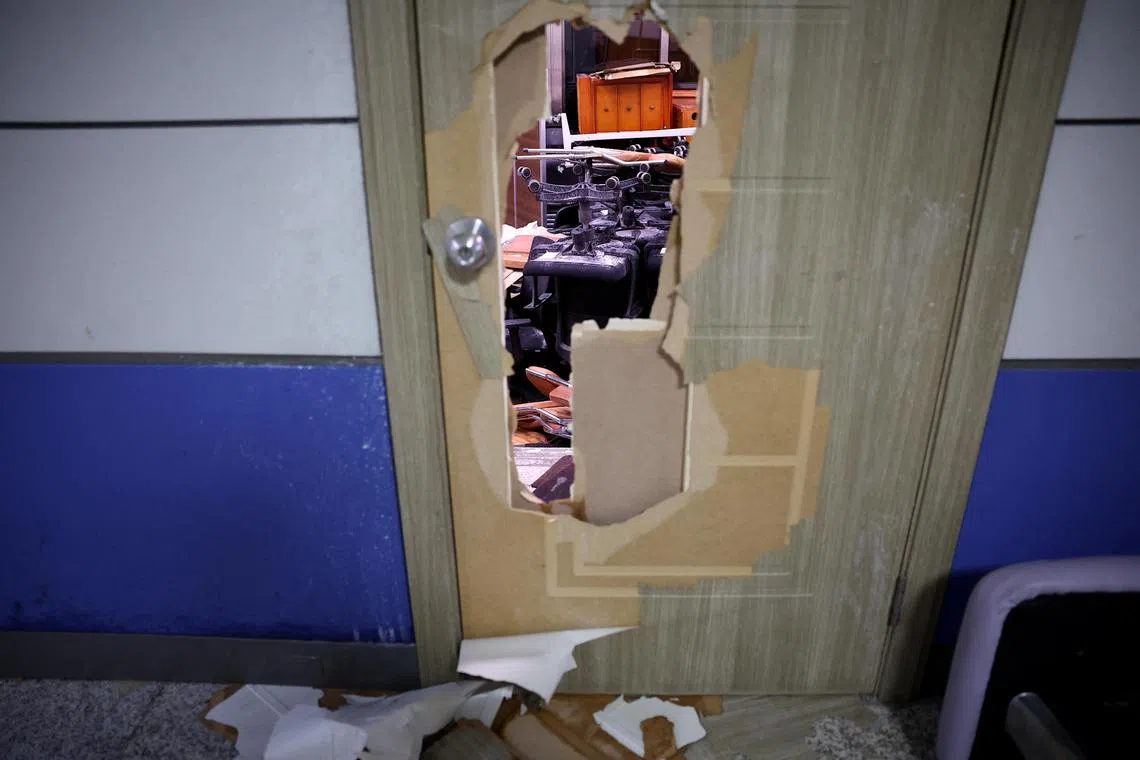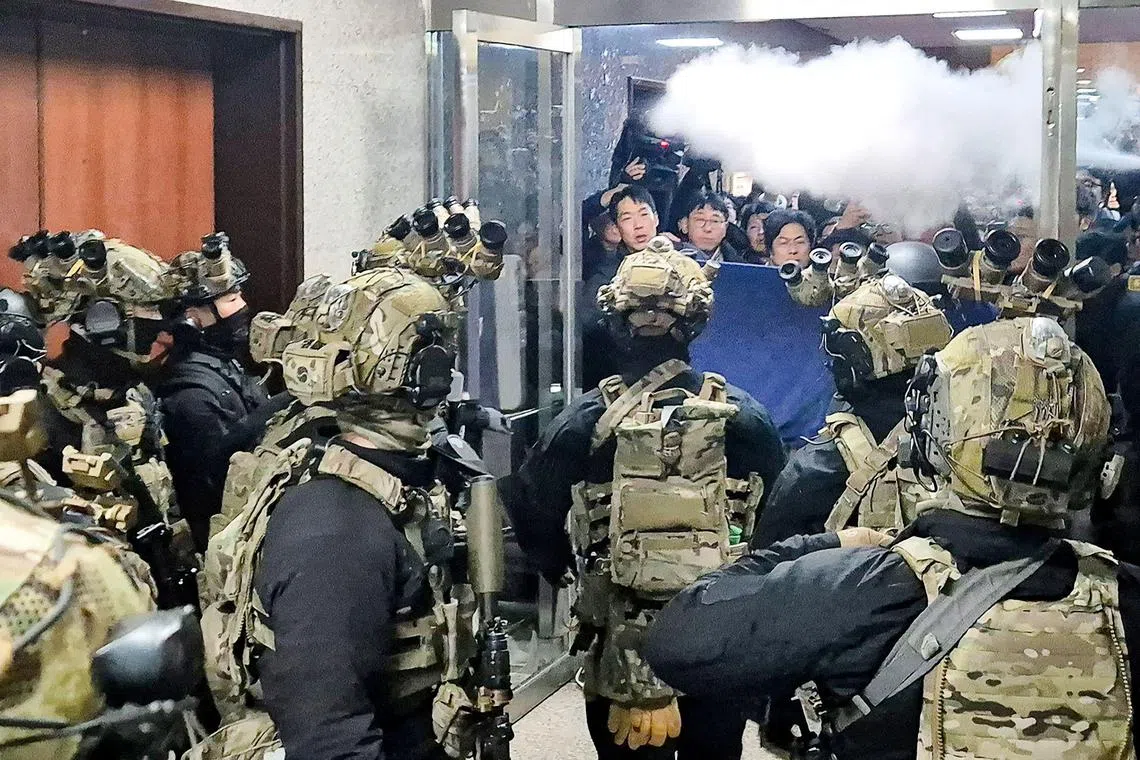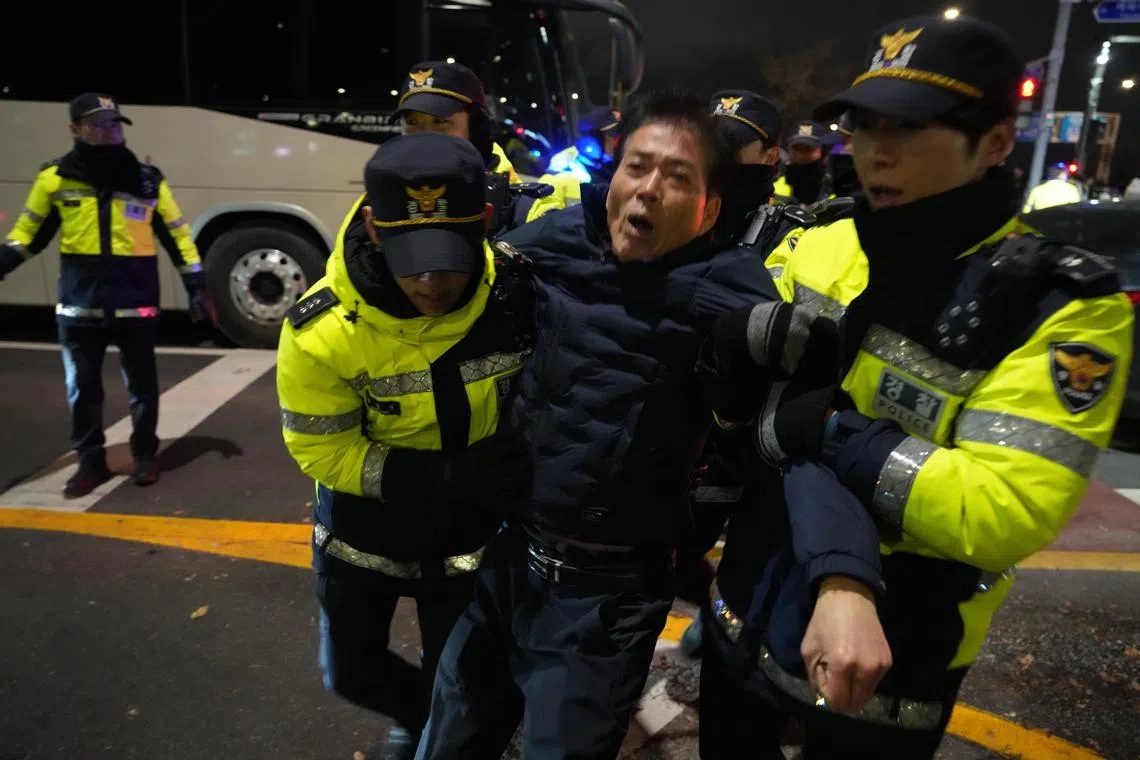South Korean President Yoon Suk Yeol faces calls to resign after failed martial law
Sign up now: Get insights on Asia's fast-moving developments
Follow topic:
SEOUL – South Korea’s President Yoon Suk Yeol said on Dec 4 he would lift martial law, just hours after imposing it in a bid to quell what he called “anti-state forces”.
He backed down after lawmakers voted to oppose the unexpected declaration, which caught even South Korea’s closest allies around the world off guard.
Earlier, the National Assembly was sealed and troops entered the building for a short time, while hundreds of protesters gathered outside and faced off with security forces.
“Just a moment ago, there was a demand from the National Assembly to lift the state of emergency, and we have withdrawn the military that was deployed for martial law operations,” Mr Yoon said in a televised address at around 4.30am (3.30am in Singapore).
“We will accept the National Assembly’s request and lift the martial law through the Cabinet meeting.”
Yonhap News Agency reported that Mr Yoon’s Cabinet approved the motion to lift the order.
The U-turn prompted jubilation among protesters outside Parliament who had braved freezing temperatures to keep vigil through the night in defiance of the martial law order.
Demonstrators waving banners and South Korean flags and chanting “Arrest Yoon Suk Yeol” outside the National Assembly erupted in cheers.
Protester Lim Myeong-pan, 55, told AFP that Mr Yoon’s decision to rescind martial law did not absolve him of wrongdoing.
“Yoon’s act of imposing it in the first place without legitimate cause is a serious crime in itself,” the protester told AFP.
“He has paved his own path to impeachment with this.”

Furniture piled up behind a door which was damaged when military forces broke into the National Assembly building, after South Korean President Yoon Suk Yeol declared martial law.
PHOTO: REUTERS
Some 190 lawmakers had managed to get into the National Assembly building in the early hours of Dec 4, where they unanimously voted in favour of a motion to block the martial law declaration and call for its lifting.
Under the Constitution, martial law must be lifted when a majority in Parliament demands it.
International concern
Mr Yoon had given a range of reasons to justify martial law – South Korea’s first in more than 40 years.
“To safeguard a liberal South Korea from the threats posed by North Korea’s communist forces and to eliminate anti-state elements plundering people’s freedom and happiness, I hereby declare emergency martial law,” he said in a live televised address late on the night of Dec 3.
He did not give details of the North’s threats, but the South remains technically at war with nuclear-armed Pyongyang.
“Our National Assembly has become a haven for criminals, a den of legislative dictatorship that seeks to paralyse the judicial and administrative systems and overturn our liberal democratic order,” he said.
Democratic South Korea is a major ally for the United States in Asia, but Washington said it was not given advance notice
“We are watching the recent developments in the ROK with grave concern,” US Deputy Secretary of State Kurt Campbell said after martial law was imposed, referring to South Korea by its official name, the Republic of Korea.
China, a key ally of North Korea, urged its nationals in the South to stay calm and exercise caution, while Britain said it was “closely monitoring developments”.
The decree by martial law commander Park An-su also banned “actions that deny or seek to overthrow the liberal democratic system, including the spread of fake news, public opinion manipulation and false propaganda”.

Soldiers trying to enter the main hall of the National Assembly on Dec 3, after South Korean President Yoon Suk Yeol declared martial law.
PHOTO: AFP
The President labelled the opposition, which holds a majority in the 300-member Parliament, as “anti-state forces intent on overthrowing the regime”.
Mr Yoon described the imposition of martial law as “inevitable to guarantee the continuity of a liberal South Korea”, adding that it would not impact the country’s foreign policy.
He described the current situation as South Korea “on the verge of collapse, with the National Assembly acting as a monster intent on bringing down liberal democracy”.
Budget row
Korea studies professor Vladimir Tikhonov of the University of Oslo said Mr Yoon’s move to impose martial law was “an attempt to wind the history back”.
“I don’t think South Korea’s civil society can recognise Yoon as a legitimate president any longer,” he told AFP.
Mr Yoon’s People Power Party and the main opposition Democratic Party are bitterly at odds over 2025’s budget.

A protester being taken into custody during a rally outside the main gate of the National Assembly building in Seoul, on Dec 3, 2024.
PHOTO: NYTIMES
Opposition MPs last week approved a significantly downsized budget plan through a parliamentary committee.
The opposition has slashed approximately 4.1 trillion won (S$3.9 billion) from Mr Yoon’s proposed 677 trillion won budget plan, cutting the government’s reserve fund and activity budgets for Mr Yoon’s office, the prosecution, police and the state audit agency.
The imposition of emergency martial law came after the President’s approval rating dropped to 19 per cent in the latest Gallup poll last week, with many expressing dissatisfaction over his handling of the economy and controversies involving his wife, Ms Kim Keon Hee. AFP

